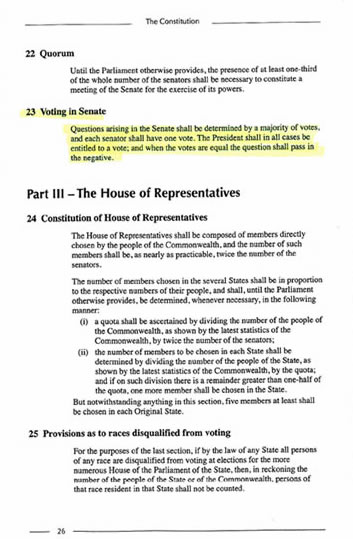116 Consideration in committee
In committee of the whole the preamble shall stand postponed without question put, and the clauses shall be read in their order separately by the chairman, and on each clause the question shall be put by the chairman, that the clause stand as printed. The words of enactment at the head of the bill shall not be put to the committee.
Amendment history
Adopted: 19 August 1903 as SO 192 but renumbered as SO 191 for the first printed edition
1989 revision: Old SO 198 renumbered as SO 116; minor modification of language for consistency
Commentary

Section 23 of the Constitution provides that equal votes lead to lost questions. This determines the form of the question used in committee of the whole to decide whether clauses should stay in bills or be deleted
An original standing order that has not been significantly modified, SO 116 embodies a fundamental principle of Senate procedure. Section 23 of the Constitution provides that questions in the Senate shall be resolved by a majority of votes, that all senators shall have a deliberative vote and that when the votes are equally divided, the question shall be resolved in the negative.
The form of the question specified in SO 116 ensures that the constitutional principle is observed at the most detailed level of the legislative process. The question, that the clause stand as printed, is designed to ensure that clauses achieve the required majority support to remain in the bill. If the votes on such a question are equally divided, the question is lost and a clause which has not attracted majority support is therefore removed from the bill.
In practice, the consideration of a bill clause by clause is now almost unheard of, the preferred method being to take the bill as a whole, by leave, for more expeditious consideration. The desire for expedition was evident from relatively early times. Edwards notes an example from 1936 when the Income Tax Assessment Bill 1936 was dealt with in committee “a page at a time”! He cites other instances during his own period as Clerk when certain bills were taken as a whole, by leave, and agreed to.[1]
When bills are taken as a whole, opposition to a clause or an equivalent self-contained segment is managed by the chair dividing the overarching question (“That the bill stand as printed”) in respect of the opposed segment, and putting the question, “That the clause [or segment] stand as printed”, to test whether it has majority support and whether it should remain in the bill.[2]